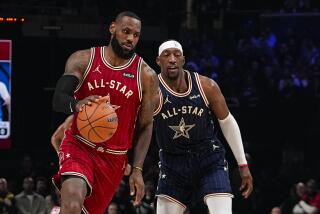The Barricade : Irbe Helped Latvia Stop Russians, and Now He Stops Shots for Sharks
- Share via
SAN JOSE — Someone yelled that soldiers were coming to drive them from the barricades, and who knew what might follow?
Arturs Irbe would not leave, could not leave. He would stop them. He would be Ka Muris . Like wall.
After Soviet forces had killed protesters in Vilnius, Lithuania, for rebelling against the government’s distant and oppressive rule early in 1991, citizens of Latvia--another Baltic state yearning for independence--protested that invasion. That made them the new targets of the government’s ire.
When the Moscow government sent tanks rolling to Riga, Latvia’s capital and Irbe’s hometown, thousands took to the streets and put up barriers to protect buildings, radio stations, TV towers and historical landmarks. Irbe, who plays now for the San Jose Sharks, was among them, prepared to fight soldiers sent by the country he had represented less than a year earlier at the 1990 World Hockey Championships.
Although he had worn the Soviet uniform, he never bought the Soviet message.
“I didn’t play for the red flag. Not for Russia,” he said. “I tried to tell people, ‘I’m not Russian. I’m Latvian.’ ”
Later, outraged by the Soviets’ heavy-handedness in the Baltics, he quit the national team, knowing he might lose a chance to showcase his talents and win a lucrative NHL contract.
And when he manned the barricades through four long, tumultuous nights, he risked his life.
“There were moments people said, ‘Troops are coming with gases,’ ” he said. “We are in the middle of a brawl, myself and my wife, and we didn’t know what was happening. Of course (there was danger). But there wasn’t that much fear because we were all together. There was a sense of the country’s heartbeat, our nation’s heartbeat.
“That was a great time and a great experience in my life. I met people back there on the streets, on the barricades, who said, ‘What are you going to do? There is a big tournament coming up, the World Championships? Are you going to play for the Soviets?’ I said, ‘No. After this I cannot do that.’ They really cheered that. I had no chance to decide any other way except to refuse. I told my wife, ‘I cannot play for them, whatever happens. I could not refuse to remember.’ ”
Irbe’s resolve--and that of his compatriots--won out. He was unhurt, and Latvia gained its independence. Its economy is unsteady, but it is free. And its people are fiercely proud of Irbe, who is tending goal for the Sharks with the same determination he showed at those barricades.
He is Ka Muris. Like wall.
“I got a phone call from Riga (last week) and the person who did the connection, the telephone company operator, I know her very well,” he said. “She was so excited, because we just won first game in Toronto. She said, ‘You wouldn’t believe the people, in the morning, they are asking each other how did Sharks do?’
“They are not talking even about how are going the talks between our president and (Russian) President (Boris) Yeltsin about withdrawing arms and troops from Latvia. The first question is how the Sharks did, did they win.”
The answer, with surprising frequency, has been yes.
In their third season, the Sharks are making an impressive first foray into the playoffs. Led by Irbe, who played an NHL-record 4,412 minutes this season and compiled a sparkling 2.84 goals-against average, they upset the top-seeded Detroit Red Wings in the first round and are even with the Toronto Maple Leafs after four games of their quarterfinal series.
On this defense-oriented team, the 27-year-old goalie is the last and most important line of defense. Stocky at 5 feet 8 and 180 pounds, he’s remarkably agile and exceptional at controlling rebounds. That means he can prevent goal-mouth scrambles that might lead to flurries of shots, and to goals.
“Without him, we wouldn’t be here,” Shark defenseman Jeff Norton said. “Archie got us this far.”
Irbe, who was drafted by Minnesota in 1989 and acquired by San Jose in the 1991 dispersal draft, will try to carry them one step farther tonight, when Game 5 is played at the San Jose Arena. The decibel levels could be ear-shattering. Shark fans, frenzied over the team’s success, roar at his every save. They serenade him with chants of “Irr-bay! Irr-bay!” and decorate the building with banners depicting walls, a tribute to his motto.
They also groan at his earnest but misguided attempts at passing the puck. Irbe has become as infamous for his bad puck handling as he is famous for puck stopping, and fans have been known to cover their eyes when he tries to make a pass. His teammates wish they could do the same.
“It’s kind of comical,” center Todd Elik said.
It’s not always funny to Coach Kevin Constantine, though. He has watched Irbe’s misadventures since the 1991-92 season, when he coached Irbe and the Kansas City Blades to the International Hockey League title.
“I just tell everybody to pay him more because he provides entertainment to fans of hockey everywhere,” Constantine said.
He hasn’t told Irbe to stop handling the puck because he has been able to laugh after most of Irbe’s gaffes. After giving the puck away to Kris Draper in Game 4 against Detroit, and to Mark Osborne in the opener against Toronto, Irbe didn’t give up another goal in either game. The Sharks won both.
“He’s very strong-willed,” forward Jeff Odgers said. “If he makes a mistake, he’ll try that much harder to make it up because he doesn’t want to let the team down.”
That resilience is why Constantine, who rarely smiles, grins when the subject is Irbe.
“Arturs is a special guy,” he said. “Our season has been heavily dependent on his goaltending. Ask anybody on the team, on the coaching staff. If we’ve had any success this season, he’s been a major part of it. Being an ex-goalie, I have a soft spot for him and a little extra affection for him.”
Even opponents like him. When Detroit’s Dino Ciccarelli crashed Irbe’s crease to distract him, Irbe chirped, “Hello, Dino.”
Ciccarelli, disarmed, was speechless.
“How can you hate a guy like that?” he said later.
With Winnipeg enforcer Tie Domi, Irbe was critical. When Domi declared he would hurt Irbe, the goalie calmly replied, “You should try to do something interesting.”
Domi was too startled to reply.
It’s not easy to carry on a conversation while facing slap shots and onrushing opponents. Shark assistant coach Wayne Thomas, whose eight-year NHL goaltending career included a Stanley Cup championship with Montreal, admires Irbe’s ability to gab and grab.
“I had enough trouble stopping the puck that I couldn’t talk to guys,” Thomas said. “A guy like (the New York Islanders’) Billy Smith, he was able to stop the puck and keep his concentration enough to yap at guys. I didn’t have that ability. Arturs is kind of matter-of-fact about it.
“He’s pretty intense, but controlled. He has an unbelievable will to win and succeed, but he manages to stay on a pretty even keel.”
Thomas attributes Irbe’s puck-handling problems to that hunger to succeed.
“He has done a great job of mastering the art of blocking pucks, with his hunger to learn and get better at the position,” Thomas said. “The next stop, in his mind, is breaking the puck out of the zone. Right now he’s caught in between. Sometimes he’s too active and tries to do too much.
“For all players, it’s a learning process of ‘simple is good.’ There’s going to be some growing pains, but thank goodness he wants to get better.”
He learned English much faster than he’s learning to pass pucks.
Irbe, who joined the Sharks’ Kansas City affiliate in 1991, used to beg off team gatherings by claiming he didn’t know the language well enough. He tripped himself up during a promotion in San Jose last season, when he was asked if he wanted to sit on the bench with a last-place NHL team or play in the minors for a division-leading team.
“It’s better to be a pauper among kings than a king among paupers,” he said.
An articulate statement for someone unfamiliar with English, and a quote that caught Constantine’s attention. He asked Irbe if he had said that exactly as written. “Yes, I did,” Irbe said, proudly.
Replied Constantine, “You just lost your English language excuse.”
Irbe uses his language skills to lead his teammates on the ice and in the locker room. He’s vocal, and his words carry weight.
“He’s very supportive,” said defenseman Sandis Ozolinsh, a fellow Latvian. “Maybe a couple of times he will get mad at defensemen and start screaming. Mostly he is supportive and he pats you on the pads. He’s great.”
When he converses, Irbe can do it in English, Latvian or Russian. He and Russian-born teammates Igor Larionov and Sergei Makarov, stars on the great Soviet teams of the 1980s, often discuss politics. Although they are products of a government that repressed his homeland, Irbe found he has more in common with them than in dispute. He especially enjoys talking with Larionov, who also rebelled, in his case against the iron fist of the Soviet hockey federation.
“I understand his point of view, but I had to learn on my own,” Irbe said. “I really almost 100% agree with Igor. I never heard from anyone who was on former Soviet team when I quit saying, ‘Shame,’ or blame me for refusing to play. They understood my nationalism and activity.”
His country is never far from his mind. Irbe went home last summer to play for Latvia in an Olympic qualifying tournament, and he brought his mother to the Bay Area this season to live with him, his wife and infant daughter. He also brought his best friends here, paying their expenses because they could not afford to. A brother and sister remain in Latvia.
“It’s a difficult time because the system is changing,” Irbe said. “The Soviet system was so deep in people’s minds, people’s routines. Young people, they can make adjustments right away. For older people, it’s real tough. . . .
“It’s becoming clear there’s no middle class. Almost none at all. Very small middle class. Bigger upper class and a very, very huge lower class, people who live on (the) minimum just to survive.
“This is some kind of extra joy in their lives, that myself and Sandis, we are playing for this team and having success. We are really playing for our country now, not only for San Jose.”
More to Read
Sign up for Essential California
The most important California stories and recommendations in your inbox every morning.
You may occasionally receive promotional content from the Los Angeles Times.














